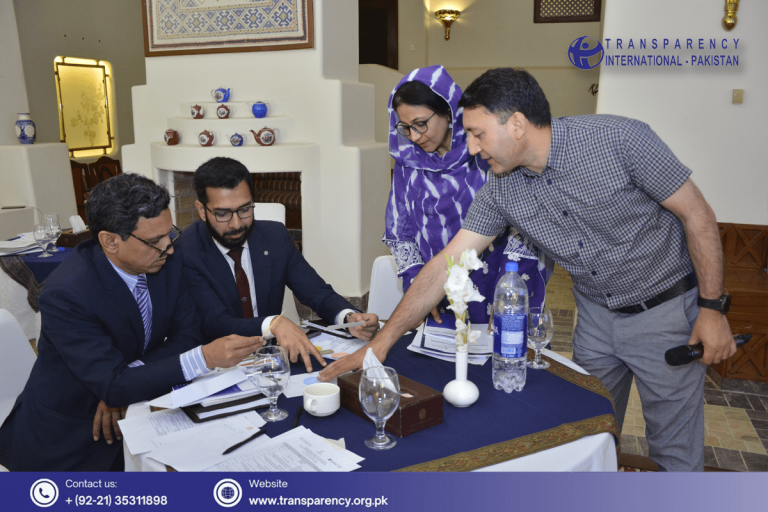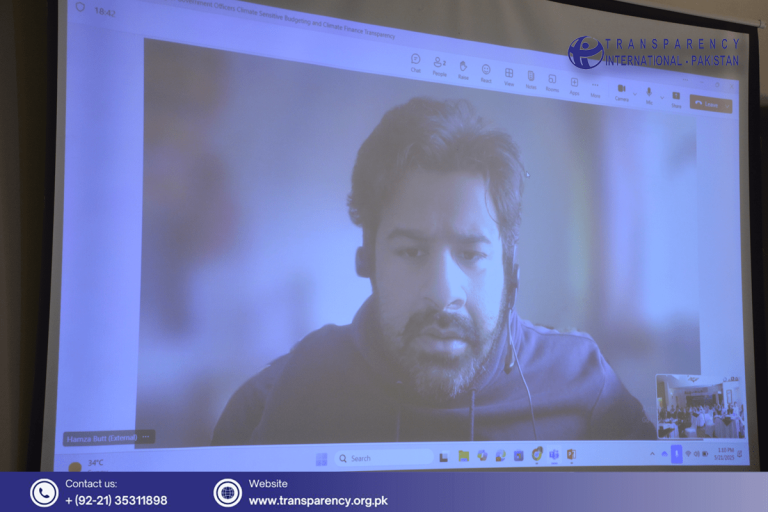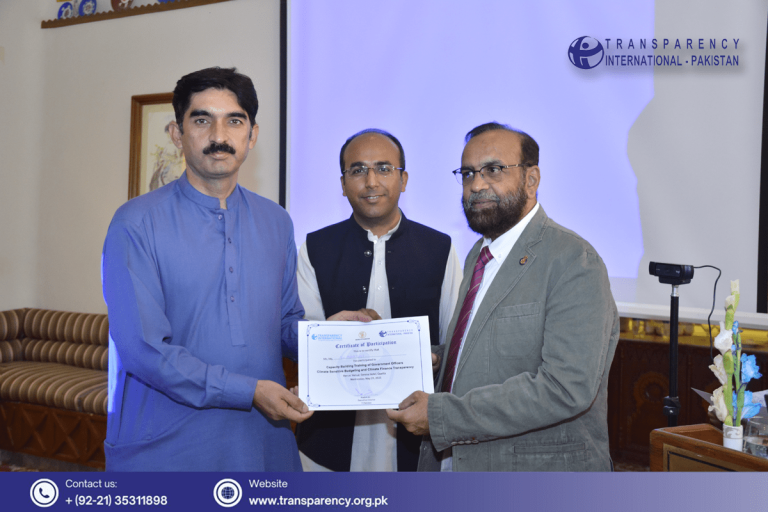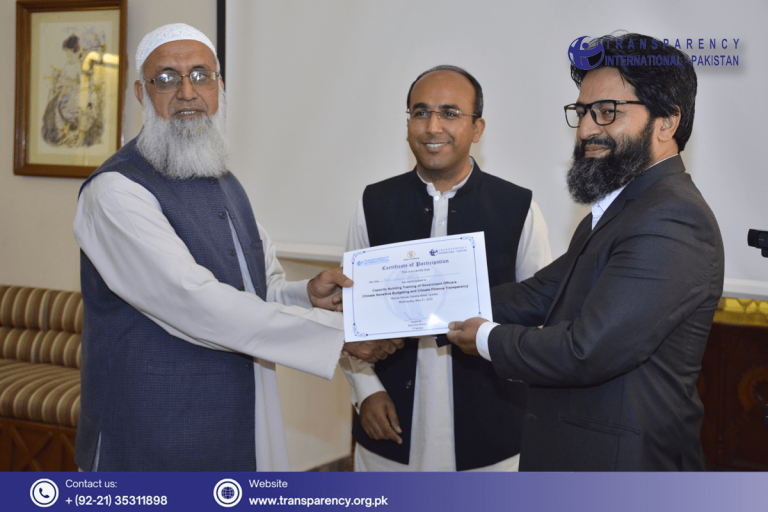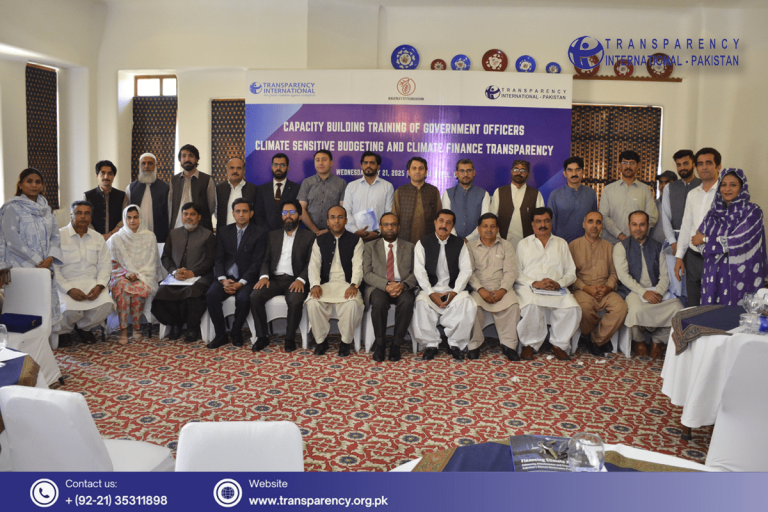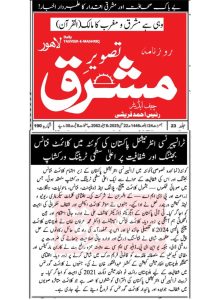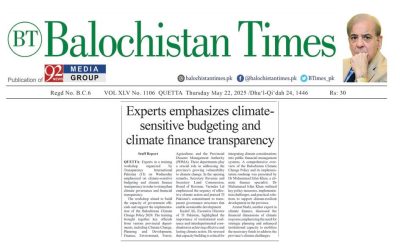Capacity Building Training of Government Officers on Climate Sensitive Budgeting and Climate Finance Transparency
Capacity Building Training of Government Officers on Climate Sensitive Budgeting and Climate Finance Transparency
Date: Wednesday, May 21, 2025
Venue: Serena Hotel, Quetta
Transparency International Pakistan organized a one-day capacity building training on climate-sensitive budgeting and climate finance transparency. The training brought together government officers from over twenty-five climate-relevant departments in Balochistan, including the Agriculture Department, Board of Revenue, Chief Minister Inspection Team (CMIT), Climate Change and Environment Department, Communication Works, Physical Planning and Housing Department, Energy Department, Finance Department, Fisheries Department, Food Department, Forest and Wildlife Department, Industries and Commerce Department, Information Department, Irrigation Department, Labour and Manpower Department, Livestock Department, Local Government and Rural Development Department, Mines and Minerals Development Department, Planning and Development Department, Public Health Engineering Department, Transport Department, Urban Planning & Development Department, Anti-Corruption Establishment Balochistan, EPA Balochistan, NAB, and PDMA Balochistan.
The event opened with remarks from Mr. Varendar Lal, Secretary Revenue and Secretary Land Commission, Balochistan Board of Revenue, who highlighted the importance of integrating transparency mechanisms into climate spending and aligning fiscal priorities with long-term sustainability goals. Mr. Kashif Ali, Executive Director of Transparency International Pakistan, welcomed the participants and emphasized the urgency of institutional reforms and implementation of Balochistan Climate Change Policy 2024 to ensure accountable and equitable climate finance governance.
Prof. Dr. Muhammad Irfan Khan provided a comprehensive overview of the Balochistan Climate Change Policy and its implementation challenges and opportunities. He discussed the importance of embedding climate goals into planning and budgeting processes and strengthening institutional coordination to operationalize the policy effectively. Mr. Azmat Shahi, Climate Financing Expert, conducted two technical sessions on understanding the climate finance landscape in Pakistan and tools for tracking and evaluating climate finance.
A dedicated session was led by Mr. Hamza Rafay Butt, a Climate & Nature Finance Expert. He delivered an in-depth presentation on carbon markets, with a focus on their potential relevance to Balochistan. He highlighted that while carbon markets can be a viable tool for climate finance generation, they carry significant governance risks if not designed and managed with integrity. Mr. Butt outlined critical principles such as transparency, equity, and benefit-sharing, stressing the need for robust regulatory frameworks to prevent elite capture, ensure community-level benefits, and uphold environmental integrity. He also discussed emerging trends in voluntary carbon markets, Article 6 of the Paris Agreement, and the potential for Balochistan to engage in nature-based carbon projects, provided that safeguards, social equity, and inclusive consultation mechanisms are firmly in place.
As part of the working tea session, participants were engaged in a breakout group activity designed to align sectoral departmental responsibilities with climate change mitigation and adaptation objectives. Departments were encouraged to reflect on their mandates and identify specific actions
they could lead or support to advance provincial climate goals. This exercise aimed to promote cross-sectoral understanding and accountability, helping departments recognize their roles in areas such as sustainable agriculture, resilient infrastructure, water resource management, renewable energy transition, and disaster preparedness.
Next, Mr. Kashif Ali, Executive Director TI Pakistan led a comprehensive session on Climate Finance Procurements: Safeguards for Transparency and Integrity. He emphasized the importance of procurement data for transparency and citizen oversight and presented case scenarios to engage the participants on procurement red flags and how to embed transparency metrics in climate related procurements. He highlighted that there is a need to integrate transparency with the different stages of the procurement cycle such as planning, contract execution, tendering and award and closing. He also explained in details Balochistan Public Procurement Regulatory Authority Rules 2014 (BPPRA) and various transparency rules inbuilt within the BPPRA such as publication of tender details, hoisting of evaluation report, complaint redressal mechanisms, publication of contract award information and the mandatory provision of the signing of integrity pact. Mr. Kashif Also emphasized the need for integrity pact in climate finance procurements with a focus on the inclusion of civil society as observers/monitors.
Moving forward, Mr. Abdul Shakoor Khan, Commissioner of the Balochistan Information Commission gave detailed presentation on Balochsitan RTI Act 2021. He emphasized the critical role of the Right to Information in enabling oversight of climate funds and empowering citizens. During the open discussion, participants highlighted the limited implementation of the Right to Information (RTI) Act in Balochistan. Participants noted low awareness among government staff and the public, weak compliance with disclosure obligations, and a lack of institutional mechanisms to process RTI requests efficiently. Suggestions included appointing RTI focal persons in all departments, digitizing records, and strengthening the Balochistan Information Commission’s oversight role. The conversation highlighted RTI as a key enabler of transparency and accountability in climate finance and governance.
A certificate distribution ceremony followed by a networking lunch marked the end of the workshop, which significantly contributed to enhancing the capacity of government institutions in Balochistan to manage climate finance with greater transparency, integrity, and accountability.











